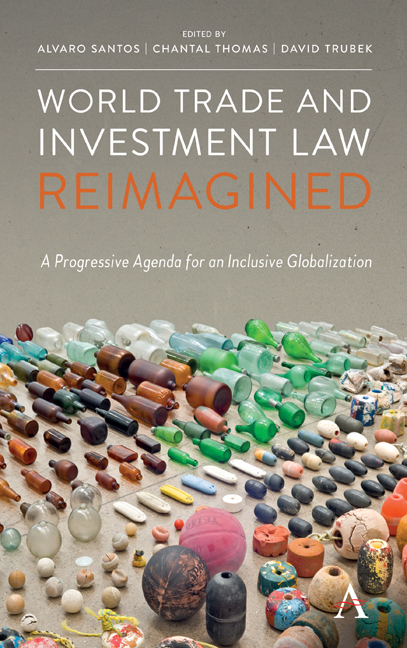Book contents
- Frontmatter
- Contents
- Acknowledgments
- List of Contributors
- Introduction World Trade and Investment Law in a Time of Crisis: Distribution, Development and Social Protection
- PART I RETHINKING THE POLITICAL ECONOMY OF TRADE: COMMENTS ON DANI RODRIK'S STRAIGHT TALK ON TRADE
- PART II SETTING THE STAGE FOR A PROGRESSIVE VISION: EMERGING ISSUES IN WORLD TRADE AND INVESTMENT LAW
- SECTION 1 MAPPING THE NEW CONTEXT FOR TRADE AND INVESTMENT LAW
- SECTION 2 DEALING WITH MAJOR CHANGES IN THE WORLD ECONOMY
- SECTION 3 FRAMING A MORE EQUITABLE INVESTMENT LAW REGIME
- Chapter Fourteen Bilateral Investment Treaties: Has South Africa Chartered a New Course?
- Chapter Fifteen Rethinking the Right to Regulate in Investment Agreements: Reflections from the South African and Brazilian Experiences 163
- Chapter Sixteen Making Local Communities Visible: A Way to Prevent the Potentially Tragic Consequences of Foreign Investment? 171
- SECTION 4 SUPPORTING DEVELOPMENT
- SECTION 5 REINFORCING SOCIAL PROTECTION: SPREADING THE BENEFITS OF TRADE, DEALING WITH LOSSES AND EXPLORING THE TRADE–IMMIGRATION NEXUS
- Index
Chapter Fifteen - Rethinking the Right to Regulate in Investment Agreements: Reflections from the South African and Brazilian Experiences 163
from SECTION 3 - FRAMING A MORE EQUITABLE INVESTMENT LAW REGIME
Published online by Cambridge University Press: 07 September 2019
- Frontmatter
- Contents
- Acknowledgments
- List of Contributors
- Introduction World Trade and Investment Law in a Time of Crisis: Distribution, Development and Social Protection
- PART I RETHINKING THE POLITICAL ECONOMY OF TRADE: COMMENTS ON DANI RODRIK'S STRAIGHT TALK ON TRADE
- PART II SETTING THE STAGE FOR A PROGRESSIVE VISION: EMERGING ISSUES IN WORLD TRADE AND INVESTMENT LAW
- SECTION 1 MAPPING THE NEW CONTEXT FOR TRADE AND INVESTMENT LAW
- SECTION 2 DEALING WITH MAJOR CHANGES IN THE WORLD ECONOMY
- SECTION 3 FRAMING A MORE EQUITABLE INVESTMENT LAW REGIME
- Chapter Fourteen Bilateral Investment Treaties: Has South Africa Chartered a New Course?
- Chapter Fifteen Rethinking the Right to Regulate in Investment Agreements: Reflections from the South African and Brazilian Experiences 163
- Chapter Sixteen Making Local Communities Visible: A Way to Prevent the Potentially Tragic Consequences of Foreign Investment? 171
- SECTION 4 SUPPORTING DEVELOPMENT
- SECTION 5 REINFORCING SOCIAL PROTECTION: SPREADING THE BENEFITS OF TRADE, DEALING WITH LOSSES AND EXPLORING THE TRADE–IMMIGRATION NEXUS
- Index
Summary
The international investment regime is under attack, and reform proposals are receiving increased attention in international negotiations and in the literature. Existing debates have put a great deal of attention on dispute settlement alternatives, while leaving out other equally contested features of the regime, such as the need for rebalancing investors’ and states’ rights and obligations. This essay intends to shift the discussion to one of these features by focusing on the countries’ right to regulate (RTR). In international investment law, RTR can be defined as the policy space available in investment agreements for countries to regulate in the public interest. Because investment agreements were created to limit certain aspects of countries’ RTR, the first wave of agreements inhibited regulatory experimentation harmful to foreign investors’ rights. Mounting domestic criticism and fear of challenges before arbitral tribunals against developed countries made them carve out some policy space within investment agreements under the rubric of RTR. This development in investment law has mostly benefited countries wanting more policy space in areas such as environment, health and safety. Investment tribunals have, by and large, accompanied these changes. Within this broad debate, however, other policy goals central to countries in the Global South have not received sufficient attention.
From the perspective of countries in the Global South, an honest reform to promote greater policy space should be able to accommodate policy experimentation in a variety of areas. In this essay, I propose to enlarge the notion of RTR in investment agreements to provide more flexibility for countries, an aspect that has been largely overlooked in the processes of reforming investment agreements and accompanying literature. An RTR approach to take account of other needs should allow countries to incorporate policy areas as diverse as redistributive justice and industrial policies.
I am focusing on the recent experiences of South Africa and Brazil in relation to RTR. While South Africa decided to terminate their bilateral investment treaties (BITs) and resort to domestic laws and institutions, Brazil chose to initiate an investment treaty program that moves away from standard investment treaty language that has the protection of foreign investment as the primary, or sole, subject matter. These two cases suggest that (1) there are alternative paths to match investors’ rights with countries’ RTR and (2) these alternatives face constant pressure to conform with the neoliberal-embedded BIT program from internal and/ or external sources.
- Type
- Chapter
- Information
- World Trade and Investment Law ReimaginedA Progressive Agenda for an Inclusive Globalization, pp. 163 - 170Publisher: Anthem PressPrint publication year: 2019

